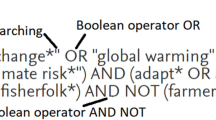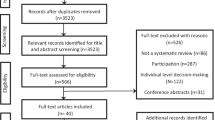Abstract
Evidence from economic evaluations is often not used to inform healthcare policy despite being well regarded by policy makers and physicians. This article employs the accessibility and acceptability framework to review the barriers to using evidence from economic evaluation in healthcare policy and the strategies used to overcome these barriers. Economic evaluations are often inaccessible to policymakers due to the absence of relevant economic evaluations, the time and cost required to conduct and interpret economic evaluations, and lack of expertise to evaluate quality and interpret results. Consistently reported factors that limit the translation of findings from economic evaluations into healthcare policy include poor quality of research informing economic evaluations, assumptions used in economic modelling, conflicts of interest, difficulties in transferring resources between sectors, negative attitudes to healthcare rationing, and the absence of equity considerations. Strategies to overcome these barriers have been suggested in the literature, including training, structured abstract databases, rapid evaluation, reporting checklists for journals, and considering factors other than cost effectiveness in economic evaluations, such as equity or budget impact. The factors that prevent or encourage decision makers to use evidence from economic evaluations have been identified, but the relative importance of these factors to decision makers is uncertain.
Similar content being viewed by others
References
Drummond M, Sculpher M, Torrance G, O’Brien B, Stoddart GL. Methods for the economic evaluation of health care programmes. 3rd ed. New York: Oxford University Press; 2005.
Hoffmann C, Graf von der Schulenburg JM. The influence of economic evaluation studies on decision making. A European survey. Health Policy. 2000;52(3):179–92.
Williams I, McIver S, Moore D, Bryan S. The use of economic evaluations in NHS decision-making: a review and empirical investigation. Health Technol Assessm. 2008;12(7):iii-63.
Eddama O, Coast J. A systematic review of the use of economic evaluation in local decision-making. Health Policy. 2008;86(2–3):129–41.
Williams I, Bryan S. Understanding the limited impact of economic evaluation in health care resource allocation: a conceptual framework. Health Policy. 2007;80(1):135–43.
Hoffmann C, Stoykova BA, Nixon J, Glanville JM, Misso K, Drummond MF. Do health-care decision makers find economic evaluations useful? The findings of focus group research in UK health authorities. Value Health. 2002;5(2):71–8.
Hall J. The impact of the economic evaluation of health care on policy and practice. Sydney: Centre for Health Economics Research and Evaluation; 1993.
Anell A, Svarvar P. Pharmacoeconomics and clinical practice guidelines: a survey of attitudes in Swedish formulary committees. Pharmacoeconomics. 2000;17(2):175–85.
Chaikledkaew U, Lertpitakpong C, Teerawattananon Y, Thavorncharoensap M, Tangcharoensathien V. The current capacity and future development of economic evaluation for policy decision-making: a survey among researchers and decision-makers in Thailand. Value Health. 2009;12(SUPPL. 3):S31–5.
Sloan FA, Whetten-Goldstein K, Wilson A. Hospital pharmacy decisions, cost containment, and the use of cost-effectiveness analysis. Soc Sci Med. 1997;45(4):523–33.
West R, Borden EK, Coller JP, Rawson NSB, Tonks RS. ”Cost-effectiveness” estimates result in flawed decision-making in listing drugs for reimbursement. Can J Publ Health. 2002;93(6):421–5.
Zwart-Van Rijkom JEF, Leufkens HGM, Busschbach JJV, Broekmans AW, Rutten FFH. Differences in attitudes, knowledge and use of economic evaluations in decision-making in the Netherlands: the Dutch results from the EUROMET project. Pharmacoeconomics. 2000;18(2):149–60.
Tarride JE, McCarron CE, Lim M, Bowen JM, Blackhouse G, Hopkins R, et al. Economic evaluations conducted by Canadian health technology assessment agencies: where do we stand? Int J Technol Assess Health Care. 2008;24(4):437–44.
Baghbanian A, Hughes I, Khavarpour FA. Resource allocation and economic evaluation in Australia’s healthcare system. Aust Health Rev. 2011;35(3):278–83.
Hasle-Pham E, Arnould B, Spath HM, Follet A, Duru G, Marquis P. Role of clinical, patient-reported outcome and medico-economic studies in the public hospital drug formulary decision-making process: results of a European survey. Health Policy. 2005;71(2):205–12.
Jansson S, Anell A. The impact of decentralised drug-budgets in Sweden—a survey of physicians’ attitudes towards costs and cost-effectiveness. Health Policy. 2006;76(3):299–311.
Fattore G, Torbica A. Economic evaluation in health care: the point of view of informed physicians. Value Health. 2006;9(3):157–67.
Walley T, Baron S, Cooke J, Drummond M. Economic evaluations of drug therapy: attitudes of primary care prescribing advisors in Great Brittain. Health Policy. 1997;41(1):61–72.
Bloom BS. Use of formal benefit/cost evaluations in health system decision making. Am J Managed Care. 2004;10(5):329–35.
Chen LC, Ashcroft DM, Elliott RA. Do economic evaluations have a role in decision-making in Medicine Management Committees? A qualitative study. Pharm World Sci. 2007;29(6):661–70.
Martin DK, Hollenberg D, MacRae S, Madden S, Singer P. Priority setting in a hospital drug formulary: a qualitative case study and evaluation. Health Policy. 2003;66(3):295–303.
Ross J. The use of economic evaluation in health care: Australian decision makers’ perceptions. Health Policy. 1995;31(2):103–10.
Singer PA, Martin DK, Giacomini M, Purdy L. Priority setting for new technologies in medicine: qualitative case study. Brit Med J. 2000;321(7272):1316–9.
Eddama O, Coast J. Use of economic evaluation in local health care decision-making in England: a qualitative investigation. Health Policy. 2009;89(3):261–70.
Dempsey AF, Cowan AE, Stokley S, Messonnier M, Clark SJ, Davis MM. The role of economic information in decision-making by the Advisory Committee on immunization practices. Vaccine. 2008;26(42):5389–92.
Bryan S, Williams I, McIver S. Seeing the nice side of cost-effectiveness analysis: a qualitative investigation of the use of CEA in nice technology appraisals. Health Econ. 2007;16(2):179–93.
Al MJ, Feenstra T, Brouwer WBF. Decision makers’ views on health care objectives and budget constraints: results from a pilot study. Health Policy. 2004;70(1):33–48.
Duthie T, Trueman P, Chancellor J, Diez L. Research into the use of health economics in decision making in the United Kingdom—Phase II. Is health economics ‘for good or evil’? Health Policy. 1999;46(2):143–57.
Mitton C, Donaldson C. Setting priorities in Canadian regional health authorities: a survey of key decision makers. Health Policy. 2002;60(1):39–58.
Ijzerman MJ, Reuzel RPB, Severens HL. Pre-assessment to assess the match between cost-effectiveness results and decision makers’ information needs: an illustration using two cases in rehabilitation medicine in The Netherlands. Int J Technol Assess Health Care. 2003;19(1):17–27.
Claxton K, Ginnelly L, Sculpher M, Philips Z, Palmer S. A pilot study on the use of decision theory and value of information analysis as part of the NHS Health Technology Assessment programme. Health Technol Assess (Winchester, England). 2004;8(31):1–103, iii.
Anell A. Priority setting for pharmaceuticals: the use of health economic evidence by reimbursement and clinical guidance committees. Eur J Health Econ. 2004;5(1):28–35.
Jenkings KN, Barber N. What constitutes evidence in hospital new drug decision making? Soc Sci Med. 2004;58(9):1757–66.
Hoffmann C. The influence of economic evaluation studies on decision making. A European survey. Health Policy. 2000;52(3):179–92.
Williams IP, Bryan S. Cost-effectiveness analysis and formulary decision making in England: findings from research. Soc Sci Med. 2007;65(10):2116–29.
Drummond M, Brown R, Fendrick AM, Fullerton P, Neumann P, Taylor R, et al. Use of pharmacoeconomics information—report of the ISPOR Task Force on use of pharmacoeconomic/health economic information in health-care decision making. Value Health. 2003;6(4):407–16.
Drummond M. Making economic evaluations more accessible to health care decision-makers. Eur J Health Econ. 2003;4(4):246–7.
Husereau D, Drummond M, Petrou S, Carswell C, Moher D, Greenberg D, et al. Consolidated health economic evaluation reporting standards (CHEERS)-explanation and elaboration: a report of the ISPOR health economic evaluation publication guidelines good reporting practices task force. Value Health. 2013;16(2):231–50.
Hjelmgren J, Berggren F, Andersson F. Health economic guidelines—similarities, differences and some implications. Value Health. 2001;4(3):225–50.
Barbieri M, Drummond MF. Conflict of interest in industry-sponsored economic evaluations: real or imagined? Curr Oncol Rep. 2001;3(5):410–3.
Thorn JC, Noble SM, Hollingworth W. Timely and complete publication of economic evaluations alongside randomized controlled trials. Pharmacoeconomics. 2013;31(1):77–85.
Brouwer WBF, Culyer AJ, van Exel NJA, Rutten FFH. Welfarism vs. extra-welfarism. J Health Econ. 2008;27(2):325–38.
Birch S, Donaldson C. Valuing the benefits and costs of health care programmes: Where’s the ‘extra’ in extra-welfarism? Soc Sci Med. 2003;56(5):1121–33.
Adang E, Voordijk L, Van Der Wilt GJ, Ament A. Cost-effectiveness analysis in relation to budgetary constraints and reallocative restrictions. Health Policy. 2005;74(2):146–56.
Alban A. The role of economic appraisal in Denmark. Soc Sci Med. 1994;38(12):1647–52.
Davies L, Coyle D, Drummond M. Current status of economic appraisal of health technology in the European community: report of the network. Soc Sci Med. 1994;38(12):1601–7.
Coyle D. Increasing the impact of economic evaluations on health-care decision making. York: University of York, Centre for Health Economics; 1993.
Ratcliffe J, Bekker HL, Dolan P, Edlin R. Examining the attitudes and preferences of health care decision-makers in relation to access, equity and cost-effectiveness: a discrete choice experiment. Health Policy. 2009;90(1):45–57.
Tappenden P, Brazier J, Ratcliffe J, Chilcott J. A stated preference binary choice experiment to explore NICE decision making. Pharmacoeconomics. 2007;25(8):685–93.
Mooney G. Economics medicine and health care. 3rd ed. Harlow: Financial Times Prentice Hall; 2003.
Harris TI. QALYfying the value of life. J Med Ethics. 1987;13(3):117–23.
Shekelle P, Newberry S, Maglione M, Shanman R, Johnsen B, Carter J, et al. Assessment of the need to update comparative effectiveness reviews: report of an initial rapid program assessment (2005–2009). Rockville: Agency for Healthcare Research and Quality (AHRQ); 2009.
Annemans L, Geneste B, Jolain B. Early modelling for assessing health and economic outcomes of drug therapy. Value Health. 2000;3(6):427–34.
High JC. The costs of economical writing. Econ Inquiry. 1987;25(3):543–5.
Laband DN, Taylor CN. The impact of bad writing in economics. Econ Inquiry. 1992;30(4):673–88.
McCloskey DN. Writing as a responsibility of science: a reply to Laband and Taylor. Econ Inquiry. 1992;30(4):689–95.
Goettsch WG, Enzing J. Review: report of the ISPOR 2012 Budget Impact Analysis Good Practice II Task Force. Value Health. 2014;17(1):1-2.
Cookson R, Drummond M, Weatherly H. Explicit incorporation of equity considerations into economic evaluation of public health interventions. Health Econ Policy Law. 2009;4(2):231–45.
Baltussen R, Niessen L. Priority setting of health interventions: the need for multi-criteria decision analysis. Cost Eff Resour Alloc. 2006;4:14.
Acknowledgments
This research was funded by the Centre of Research Excellence for Reducing Hospital Acquired Infections. The authors have no conflicts of interest that are directly relevant to the content of this manuscript.
Author contributions
Gregory Merlo is the guarantor of the overall content. The idea of the paper was developed by Gregory Merlo and Katie Page. The manuscript was prepared by Gregory Merlo. Katie Page, Julie Ratcliffe, Kate Halton and Nicholas Graves contributed to this paper by reviewing the manuscript and adding content.
Author information
Authors and Affiliations
Corresponding author
Additional information
This article is part of the Topical Collection on The influence of Health Economists on Health Policy.
Rights and permissions
About this article
Cite this article
Merlo, G., Page, K., Ratcliffe, J. et al. Bridging the Gap: Exploring the Barriers to Using Economic Evidence in Healthcare Decision Making and Strategies for Improving Uptake. Appl Health Econ Health Policy 13, 303–309 (2015). https://doi.org/10.1007/s40258-014-0132-7
Published:
Issue Date:
DOI: https://doi.org/10.1007/s40258-014-0132-7




